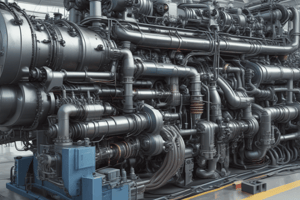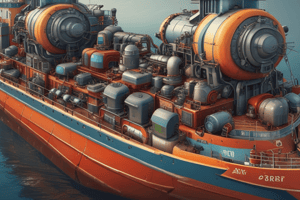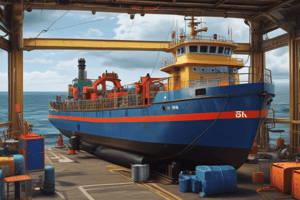Podcast
Questions and Answers
Describe the function of a main engine turbocharger.
Describe the function of a main engine turbocharger.
The main engine turbocharger is responsible for increasing the engine's efficiency by compressing air before it enters the combustion chamber, allowing more fuel to be burned and increasing power output.
Describe how the turbocharger is cooled.
Describe how the turbocharger is cooled.
The turbocharger is cooled by engine coolant or oil, which circulates around the turbocharger to dissipate heat and prevent overheating.
Describe how the turbocharger is lubricated.
Describe how the turbocharger is lubricated.
The turbocharger is lubricated by engine oil, which is supplied through dedicated oil lines to ensure smooth operation and reduce friction.
State the important checks that must be made during the drive inspection of a diesel engine chain-driven camshaft.
State the important checks that must be made during the drive inspection of a diesel engine chain-driven camshaft.
Explain why the checks described in the previous question are necessary.
Explain why the checks described in the previous question are necessary.
Describe the principle of operation of a simple hydraulic governor.
Describe the principle of operation of a simple hydraulic governor.
Outline the actions that must be taken by the on-watch engineer when the engine crankcase oil mist detector activates.
Outline the actions that must be taken by the on-watch engineer when the engine crankcase oil mist detector activates.
Sketch a crankcase explosion relief door, labeling the main components.
Sketch a crankcase explosion relief door, labeling the main components.
What are FIVE properties required of lubricating oil?
What are FIVE properties required of lubricating oil?
Explain the principle of operation of a magnetic lubricating oil filter.
Explain the principle of operation of a magnetic lubricating oil filter.
Explain the principle of operation of a centrifugal lubricating oil filter.
Explain the principle of operation of a centrifugal lubricating oil filter.
Explain the principle of operation of a coalescer lubricating oil filter.
Explain the principle of operation of a coalescer lubricating oil filter.
Explain the principle of operation of a plate edge (e.g. auto-klean) lubricating oil filter.
Explain the principle of operation of a plate edge (e.g. auto-klean) lubricating oil filter.
How can leaking cylinder air start valves be detected while the engine is running?
How can leaking cylinder air start valves be detected while the engine is running?
What is the procedure upon discovery of leaking cylinder air start valves?
What is the procedure upon discovery of leaking cylinder air start valves?
What are four possible causes of leaking cylinder air start valves?
What are four possible causes of leaking cylinder air start valves?
Which of the following could cause abnormal diesel engine noise during operation?
Which of the following could cause abnormal diesel engine noise during operation?
What could be a potential cause of knocking noises in a diesel engine?
What could be a potential cause of knocking noises in a diesel engine?
Which of the following could lead to rattling noises in a diesel engine?
Which of the following could lead to rattling noises in a diesel engine?
What could be a potential cause of whistling noises in a diesel engine?
What could be a potential cause of whistling noises in a diesel engine?
Which of the following could lead to chattering noises in a diesel engine?
Which of the following could lead to chattering noises in a diesel engine?
Study Notes
Main Engine Turbocharger
- Increases engine efficiency by compressing intake air, resulting in more power output from the same engine size.
- Utilizes exhaust gases to spin its turbine, providing energy for air compression.
Turbocharger Cooling
- Cooled by engine coolant circulating through a dedicated cooling jacket.
- Alternatively cooled by engine oil to maintain optimal operating temperatures.
Turbocharger Lubrication
- Lubricated by engine oil which is supplied under pressure to reduce friction and wear on moving parts.
- Oil flow is regulated to ensure adequate lubrication during operation.
Checks During Drive Inspection of Diesel Engine Chain-Driven Camshaft
- Inspect chain tension and condition to prevent slippage or failure.
- Check alignment of camshaft to ensure proper operation.
- Examine wear on sprockets and chains to assess future maintenance needs.
Importance of Checks on Diesel Engine Chain-Driven Camshaft
- Ensures reliable engine timing, preventing misfires and enhancing engine performance.
- Early detection of wear can prevent more severe engine damage and costly repairs.
Principle of Operation of Simple Hydraulic Governor
- Regulates engine speed by adjusting the fuel supply based on the engine's RPM.
- Utilizes hydraulic pressure changes to control the position of fuel control valves.
Actions Following Activation of Crankcase Oil Mist Detector
- Immediately reduce engine load and maintain watch on engine parameters.
- Investigate potential oil mist source and take emergency shutdown procedures if necessary.
Crankcase Explosion Relief Door Components
- Relief door (main component for preventing pressure build-up).
- Protective cover (provides safety and prevents debris entry).
- Hinges (allow for quick opening during pressure fluctuation).
Properties Required of Lubricating Oil
- High viscosity index to maintain stable performance across temperature variations.
- Good thermal stability to resist breakdown at high temperatures.
- Excellent detergency to keep engine components clean from deposits.
- Low pour point to ensure fluidity in cold conditions.
- Proper anti-wear properties to protect engine surfaces against friction.
Principle of Operation of Magnetic Lubricating Oil Filter
- Uses magnets to attract and trap ferrous metal particles from the oil, preventing engine wear.
- Provides continuous filtration as oil circulates through the engine.
Principle of Operation of Centrifugal Lubricating Oil Filter
- Spins oil at high speeds, using centrifugal force to separate contaminants from the oil.
- Heavy particles are ejected to the outer wall, while cleaned oil returns to circulation.
Principle of Operation of Coalescer Lubricating Oil Filter
- Combines small droplets of contaminants and water into larger ones, allowing gravity to separate them from the oil.
- Promotes cleaner oil through effective removal of impurities.
Principle of Operation of Plate Edge (Auto-Klean) Lubricating Oil Filter
- Oil flows through a series of grooved plates, which capture particles and contaminants.
- Self-cleaning mechanism allows for automatic removal of trapped debris during operation.
Detecting Leaking Cylinder Air Start Valves
- Monitor engine performance for irregularities in start-up behavior or airflow sound.
- Listen for hissing or leaking sounds indicating unauthorized air escape.
Procedure Upon Discovery of Leaking Cylinder Air Start Valves
- Immediately isolate the affected cylinder and assess valve condition.
- Report findings and carry out necessary repairs to prevent operational hazards.
Possible Causes of Leaking Cylinder Air Start Valves
- Wear or damage on valve seals leading to improper sealing.
- Corrosion or debris accumulation affecting valve operation.
- Improper installation or misalignment of valve components.
- Hydraulic pressure fluctuations causing valve malfunction.
Causes of Abnormal Diesel Engine Noise
- Misalignment or wear of components leading to mechanical noise.
- Inadequate lubrication or cooling causing increased friction sounds.
Potential Causes of Knocking Noises in Diesel Engine
- Pre-ignition or detonation due to fuel quality or timing issues.
- Worn bearings or loose connecting rods causing excessive play.
Possible Causes of Rattling Noises in Diesel Engine
- Loose components, such as covers or heat shields, creating movement noise.
- Hydraulic lifter issues leading to inconsistent valve operation.
Potential Causes of Whistling Noises in Diesel Engine
- Air leaks in intake or exhaust systems causing high-pitched sounds.
- Turbocharger issues leading to abnormal airflow noises.
Possible Causes of Chattering Noises in Diesel Engine
- Fuel injection timing problems leading to inconsistent combustion.
- Malfunctioning fuel injectors causing irregular fuel delivery.
Studying That Suits You
Use AI to generate personalized quizzes and flashcards to suit your learning preferences.
Description
Prepare for the Small Vessel Second Engineer certification exam administered by the Scottish Qualifications Authority on behalf of the Maritime and Coastguard Agency. This exam focuses on Marine Diesel Engineering and will take place on Friday, 05 February 2021 from 1400-1600 hrs.




